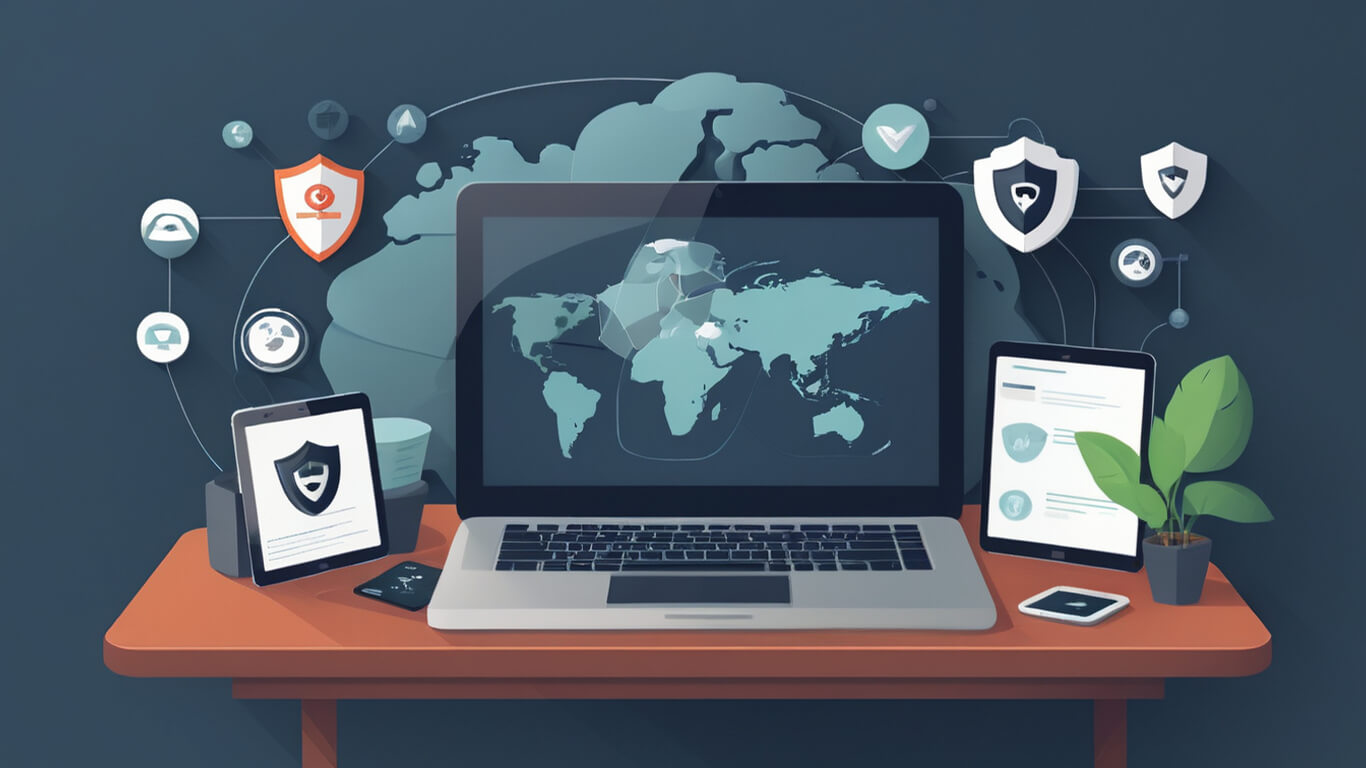In the contemporary digital landscape, the significance of online security and privacy has markedly increased. A widely utilized tool to bolster security measures on the internet is the Virtual Private Network (VPN).
The forthcoming discussion will delve into the advantages associated with employing a VPN, which encompass heightened security measures and the ability to circumvent geographical restrictions. Furthermore, the discourse will encompass guidance on selecting an appropriate VPN service, configuring it effectively, and optimizing security through adherence to recommended practices and strategies.
Moreover, prevalent misconceptions regarding VPNs will be scrutinized and dispelled, elucidating and correcting any misinformation that may be circulating. For individuals seeking to implement a VPN to fortify their security measures, it is recommended to continue reading to gain comprehensive insights on the subject matter.
What is a VPN and How Does it Work?
A Virtual Private Network (VPN) is a technology that ensures optimal security and privacy for online activities. It establishes a secure encrypted tunnel between the user’s device and the internet, protecting data from potential threats and cyber attacks.
Through the encryption of data transmitted between the user’s device and the VPN server, all online interactions are rendered scrambled and incomprehensible to any unauthorized parties attempting to intercept or monitor them. This encryption process is a fundamental element of how VPNs safeguard sensitive information, including passwords, financial data, and personal communications.
In essence, a VPN functions as a protective barrier that obfuscates internet traffic, significantly reducing the likelihood of hackers or unauthorized entities compromising online privacy. Consequently, VPN technology is integral to the cybersecurity landscape, providing users with a dependable and efficient means of securely accessing the internet.
Benefits of Using a VPN
The utilization of a VPN presents users with a multitude of advantages, encompassing heightened online security and privacy, protection of personal information, and the assurance of secure online transactions. By effectively safeguarding online activities and mitigating unauthorized access, VPNs serve as a pivotal component in upholding a secure and private online presence.
Enhanced Security and Privacy
One of the primary advantages of utilizing a VPN is the heightened security and privacy it affords. Through the encryption of internet traffic and the assurance of secure browsing, a VPN bolsters digital security and safeguards data from potential threats. It facilitates secure online communication, protecting sensitive information from unauthorized access.
The significance of these capabilities is paramount in the contemporary interconnected environment characterized by prevalent cyber threats. VPNs serve as a defense mechanism against hackers, identity thieves, and other nefarious entities seeking to compromise privacy or intercept confidential data. Given escalating concerns regarding online privacy, the adoption of VPN services has become imperative for both individuals and businesses, furnishing an additional layer of protection within an increasingly susceptible digital realm.
Ability to Bypass Geo-Restrictions
The use of a Virtual Private Network (VPN) provides users with the capability to circumvent geo-restrictions that are placed on specific websites or content. This functionality not only serves to bolster network security by offering protection against potential cyber threats, but it also guarantees secure data exchange and shields online identities from unauthorized intrusions.
VPNs are instrumental in fortifying online activities and preserving user confidentiality. By encrypting internet traffic and directing it through secure servers, VPNs establish a secure conduit for the transmission of data, thereby complicating the interception of sensitive information by hackers or unauthorized entities. This robust encryption methodology ensures the confidentiality and protection of personal details, browsing history, and online communications. Users can avail themselves of uninhibited access to online content, all the while enjoying the assurance that their online presence remains shielded from prying eyes.
How to Choose the Right VPN
Choosing the appropriate VPN service is imperative to guaranteeing secure data transfer, confidential browsing, and preventing data breaches. It is paramount to take into account multiple factors when selecting a VPN provider that is in accordance with your individual security and privacy requirements.
Factors to Consider
When selecting a VPN service, it is imperative to consider various factors to guarantee online privacy, network security, and secure online activities. The principal goal is to identify a VPN service provider that prioritizes data privacy and guarantees a secure online environment for users.
A critical aspect to consider is the logging policy of the VPN provider. It is advisable to choose a service with a stringent no-logs policy, indicating that they do not monitor or retain your online activities. Additionally, the encryption protocol employed by the VPN is crucial in safeguarding data. It is recommended to opt for VPN services that utilize robust encryption techniques such as AES-256, recognized for its high-level security measures.
Furthermore, assessing the server network is essential. It is imperative to verify that the VPN service encompasses an extensive array of servers in diverse locations to ensure optimal performance and flexibility in accessing geo-blocked content.
Setting Up a VPN
Establishing a Virtual Private Network (VPN) enables users to establish a secure internet connection, facilitating secure remote access and ensuring a safe online experience. Through the creation of an encrypted tunnel between the user’s device and the VPN server, individuals can significantly enhance their online security and privacy.
Step-by-Step Guide
A guide providing detailed instructions for setting up a VPN encompasses securing data sharing, protecting against potential hackers, ensuring secure online transactions, and maintaining the security of stored data. Diligently following these steps will not only enhance online security but also protect sensitive information effectively.
The first step in this process involves the selection of a reputable VPN service provider recognized for its robust encryption protocols and a strict no-logs policy. Subsequently, the chosen VPN client should be installed on the desired device, whether it be a computer, smartphone, or tablet.
Following the installation, the VPN settings should be configured according to individual preferences, including the selection of specific servers and enabling kill switches for additional security measures. Once the settings are finalized, a secure connection should be established by connecting to the VPN server of choice.
Furthermore, it is advisable to regularly update the VPN software and remain informed about any security patches or updates provided by the service provider to ensure optimal security measures are in place.
Maximizing Security with a VPN
Enhancing security through the utilization of a Virtual Private Network (VPN) encompasses safeguarding against potential cyber threats, upholding a secure digital presence, mitigating risks of unauthorized surveillance, and guaranteeing the secure transmission of data. By adhering to recommended practices and guidelines, individuals can augment their levels of online security and privacy.
Best Practices and Tips
Adhering to best practices and recommendations when utilizing a Virtual Private Network (VPN) encompasses securing Wi-Fi connections, ensuring online security, protecting online transactions, and mitigating data breaches. By adhering to these protocols, individuals can uphold a secure online presence and safeguard sensitive data.
One pragmatic approach to bolstering security while utilizing a VPN involves utilizing the kill switch feature, which automatically severs the internet connection if the VPN connection fails. Enabling two-factor authentication for account logins provides an additional layer of security. Regularly updating the VPN software ensures that any potential vulnerabilities are promptly addressed. It is also advisable to opt for a VPN service provider that refrains from storing user logs to further enhance privacy. Implementation of these measures can significantly enhance the efficacy of VPN usage in safeguarding personal data online.
Common Misconceptions about VPNs
Addressing prevalent misconceptions surrounding VPNs requires dispelling myths and misinformation pertaining to online security, ensuring a secure online environment, promoting safe online practices, and fortifying protection against identity theft. Through the debunking of these myths, individuals can gain a clearer comprehension of the genuine advantages associated with utilizing VPN services.
Debunking Myths and Misinformation
Dispelling myths and misinformation surrounding VPNs entails clarifying misconceptions concerning online privacy tools, secure online accounts, protection of personal data, and the assurance of secure online browsing. By furnishing precise information, users can judiciously decide on the utilization of VPN services.
A prevalent fallacy is the notion that VPNs serve solely for illicit activities or are exclusive to tech-savvy individuals. In actuality, VPNs are invaluable assets for individuals seeking to fortify their online presence.
Another misunderstanding revolves around the belief that VPNs substantially impede internet speeds. While a minor deceleration in speed may occur due to encryption, the advantages of heightened privacy and security surpass this slight inconvenience.
Furthermore, it is imperative to acknowledge that VPNs enable the circumvention of geo-restrictions, granting users access to content that might otherwise be limited in their locale.





